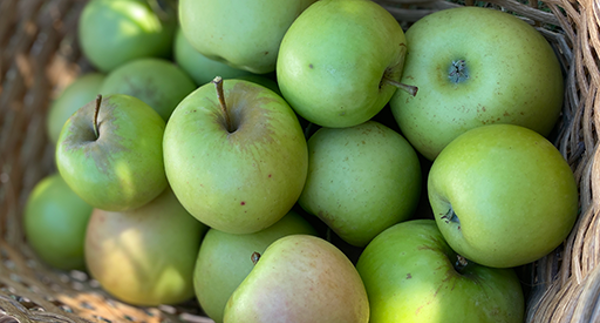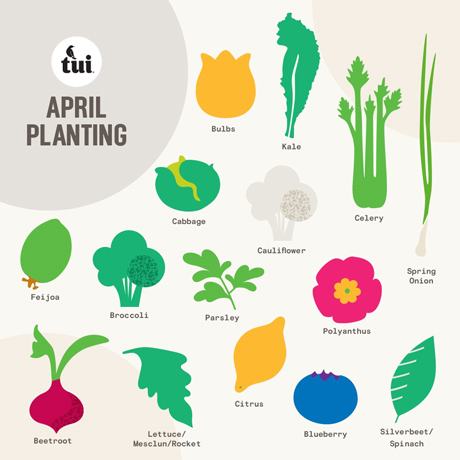
As you harvest the last summer crops it's time to plant your patch with winter staples including broccoli, cabbage, celery and silverbeet. Freshen the flower garden with pansies and polyanthus and don't forget feijoas in the fruit garden.

Find out what else to plant in your region with our planting calendar here
In the vegetable garden
- Dig in compost and Tui Sheep Pellets before planting to replenish nutrients used by previous crops. Compost is also an excellent water saver. Find out how to make your own with our Beginner's Guide to Composting.
- Beans - tie up floppy plants, and keep them well watered - they should keep producing for another month or so.
- Brussels sprouts - stake taller plants to prevent them from falling over.
- Carrots - thin rows of carrots to ensure the roots develop evenly.
- Sweetcorn - pull out plants once they have finished, and add the stems to the compost heap.
- Tomatoes - in cold areas, pull out plants and leave any green fruits on a windowsill to ripen in the sun (this may take a few weeks).
- Plant beetroot, broccoli, cabbages, cauliflower, cavolo nero, celery, kale, lettuce, radishes, rocket, spinach, silverbeet, spring onions, coriander, parsley, oregano, rosemary, sage and thyme.
- Harvest beans (all types except broad beans), beetroot, broccoli, cabbages, capsicums, carrots, cauliflowers, celery, chillies, courgettes, cucumbers, lettuce, marrows, peas, potatoes, sweetcorn, tomatoes.
- Feed established plants once a month with Tui Organic Seaweed Plant Tonic.
- Lay Tui Quash to control slugs and snails eating your leafy greens. If you don’t have any Quash on hand, try cracked egg shells around seedlings or beer traps! If you can give up a small amount of your favourite ale – leave a wide jar in the garden that will attract slugs that will crawl in and drown.
In the fruit garden
- Pick grapes, apples, Chilean guava, pears, rhubarb, walnuts, passion fruit, late peaches.
- Plant evergreen frost hardy fruits such as feijoa (see our feijoa growing guide here) and Chilean guavas.
- Remove runners from strawberry plants and pot up into Tui Strawberry Mix ready for planting out in winter.
- It's a great time to plant citrus including lemon, orange, lime and mandarin. Follow our Citrus Growing Guide for a bumper crop of juicy fruit.
- Remember - fruit requires a position in full sun. Shelter from prevailing winds is preferable.
- Aphids, whitefly and scale insects may be about, blast off with a hose or select a suitable spray from your garden centre.
- Pruning - once nectarines, peaches and plums have finished fruiting prune to shape and to remove any dead or diseased branches.
- Add a layer of Tui Mulch & Feed around the base of fruit trees, to keep the soil warmer over the winter months and keep the area weed free.
In the flower garden
- Pick scabious, Peruvian lily, poppies, marguerite daisy, statice, Japanese anemones, roses, coreopsis, echinacea, strawflowers, dahlias, lilies, sweet peas, gypsophila, cosmos, zinnia, pineapple lily, agapanthus, hydrangeas.
- Sow bellis, polyanthus, violas, primula, pansies, flowering kale, poppies, wildflowers, gazania, dianthus.
- Plant autumn hanging baskets with bellis, lobelia, polyanthus, flowering kale, primula, pansies, violas, snapdragons, wildflowers, sweet william, cineraria.
- It's not too late to plant bulbs for spring flowering. Fertilise existing ones with Tui Bulb Food.
- Apply a side dressing of Tui NovaTec Premium fertiliser to shrub borders and flower gardens.
- Add layers of Tui Mulch & Feed or Tui Pea Straw Mulch to garden beds and pots to conserve water, reduce weeds and add valuable nutrients back to the soil. If you don’t have any mulch on hand you can make your own using autumn leaf drop, grass clippings from the lawn, pine needles and straw you may already have.
- Prune back summer flowering perennials and bulbs that have finished for the season, to tidy up garden borders and beds.
- Lift and divide overgrown perennials.
- Save and dry seeds of summer flowers for sowing in the spring.
When should I plant
in
Loading...
Post a comment
April Gardening Guide Comments
Wow, so much to do! I am new to the guides and find this really helpful
Joanna Dickinson
Hi Joanna, that's fantastic to hear. Good on you for growing your own! We're happy to help with guides and tips - check out our Facebook and Instagram too. Happy gardening from the Tui Team
jenna
Yes there seems a lot to do to keep the garden growing etc. With the weather wet and cold like it is, one does not feel like going outside. You have reminded me to get my cabbage seeds in before too late. Thanks
Sharon
Is it to late to trim back hedging plants - eg Pittosporum's? thanks :)
Erin
Hi team, my capsicum started fruiting very late this summer (he'd been overshadowed by a very enthusiastic courgette plant). So I now have a bunch of small fruit on the plant. Will they grow any further or should I call it a day and pull the plant out? Thanks!
Emma
We put in a Billington plum tree nearly 3 years ago, the first year we had 3 plums and this last year we got only 1. A friend suggested that we probably need a pollinator. Is this the case and if so, which variety of plum should we plant?
Judy Leuschke
First time reader, lots to do but feel more inspired than ever!
Lyn Little
Hi Lyn, autumn is a busy but exciting time in the garden. Great to hear you are feeling inspired! Happy gardening from the Tui Team
jenna
Hi Emma, great work on growing your own summer crops. If the weather is warm enough they will continue to grow for a bit longer. It really depends where in the country you live? We still have capsicums growing well here in the Bay of Plenty but the weather is starting to cool. You could leave the plant for another few weeks to see how it goes, as you might still get some fruit! Happy gardening from the Tui Team
jenna
Hi Judy, plum trees can take a few seasons to produce fruiting spurs, Billington is self fertile so you do not need a second plant. It can take up to 5 years, so a little more patience may be required. Feed with Tui NovaTec Premium fertiliser in spring and apply Tui Organic Seaweed Plant Tonic regularly. All the best ^Tui Team
jenna
Hi Erin, now is a great time to prune back hedges, as it allows the plant to re-cooperate over winter ready for a new flush in the spring. A side dressing of fertiliser will help now as well, and a layer of mulch will help keep the weeds away and the soil warmer too. ^Tui Team
jenna
Hi, I had a great yield from my passionfruit plant this summer but now the leaves have fallen off and just the ends are green and growing. Should I prune it back to get new growth for next season and is now a good time to do so? Thanks
David
Hi David, pruning helps maintain a manageable vine. If you are in a frost prone area leave pruning until early spring as new growth will get frosted in winter, and it will knock the vine back and could lead to disease getting into the plant. If you are in a frost free area prune after harvest, remove weak or dead growth and cut the vine back by about one third. Passionfruit naturally lose their leaves over winter. Pick them up and dispose of in the rubbish to stop the spread of disease and any overwinter insect pests that may be present.
Tui Team
Hi, I get so confused as to when I should trim the many buxus hedges I have, how tall should I let them grow and what do I spray and feed them with. Is it too late to trim now in Canterbury Selwyn district?
Jane
Hi Jane, the best time to trim buxus hedges is in early spring, around August, and again in late summer, early autumn. Wait until then as it is getting late in the season in your region now. As to the height, it depends on whether they are a low hedge or in a garden border and trimmed to maintain shape. If wanting to reduce the height of the plants cut them back by approximately one third, and then trim the new growth, do this in spring, especially if you are in a frost prone area. The plants benefit from regular feeding with a nitrogen rich fertiliser such as Tui Novatec in spring and in late summer, early autumn. Regularly water the plants, it could be twice a week in summer, depending upon the weather. Mulching around the plants is always beneficial to help conserve soil moisture. Buxus are relatively hardy, they can be troubled by scale insect which is a sucking insect, a pyrethrum based insecticide or plant spraying oil will help this, they are also prone to Buxus Blight which is a fungal disease, which thrives in humid conditions, improve air circulation around your plants and avoid watering the foliage, make sure the water goes on the soil. By keeping your plants well watered, regularly fertilised in the growing season, it will hopefully be free of pests and diseases.
The Tui Team
Soooooooooooooooooooooooo helpful loved the advice. My garden is blooming now!!!!!!!!!!!!!!!
caitlin
Hi, we have a special birthday in April can you tell me what plants flower in April so I can start planting for a good show.
Michelle
Hi Michelle, without knowing which region you are in and whether you are looking at a particular colour theme, there are many autumn flowering plants that will be available in garden centres if not now, very soon as they are cool temperature plants and are a bit shy of heat, plants like primula, pansies, violas and cyclamen prefer the cooler temperatures. Plants to consider are asters, chrysanthemums, alyssum, pansies, violas, stock, cosmos, salvia, echinacea, primula, nigella, lobelia, polyanthus, fuchsia, cornflower, calendula, and cyclamen. Some summer flowering plants such as marigolds, begonias and petunias will continue flowering into autumn, dead head roses and other garden flowers to prolong flowering. Keep the water up to the garden and regularly feed with a liquid fertiliser such as Tui Seaweed & Fish every two weeks to encourage flowering and to keep plants actively growing and looking good.
Lianne